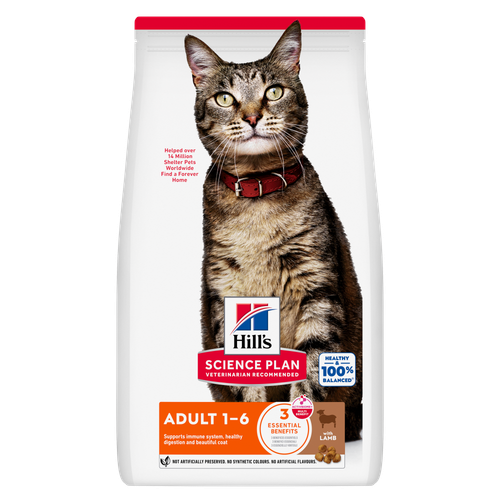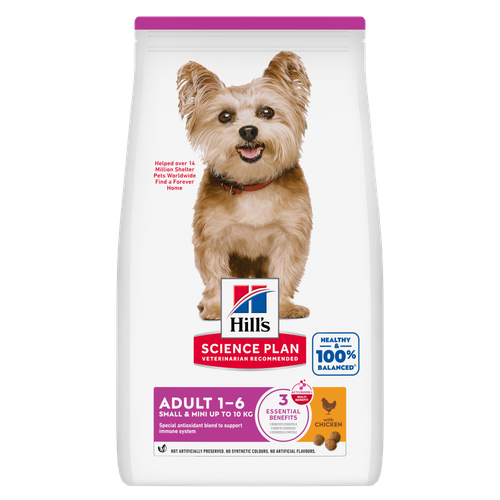
-
Featured products
 Perfect Weight Adult Dog Food with Chicken & Vegetables
Perfect Weight Adult Dog Food with Chicken & VegetablesHill's Science Plan Perfect Weight Adult Dog Food with Chicken & Vegetables ia a complete premium dog food for dogs prone to weight gain or who are slightly overweight. This savoury tinned loaf is enriched with ingredients that support healthy weight maintenance & long-lasting weight support.
Shop Now Small & Mini Adult Dog Food
Small & Mini Adult Dog FoodHill's Science Plan Small & Mini Breed Adult Dog Food with Lamb & Rice is a complete pet food, specially formulated with ActivBiome+ Multi-Benefit Technology.
Tailored nutrition for the unique needs of small dogs during the prime of their life.Shop Now Small & Mini Puppy Dog Food
Small & Mini Puppy Dog FoodHill's Science Plan Puppy Small & Mini Breed Dog Food with Chicken is a complete pet food, specially formulated with ActivBiome+ Multi-Benefit Technology.
100% balanced nutrition to support optimal growth & the immune system.Shop NowFeatured products Adult Cat Food
Adult Cat FoodHill's Science Plan Adult Cat Food with Lamb & Rice is a complete pet food, specially formulated with ActivBiome+ Multi-Benefit Technology.
This food is specially formulated to fuel the energy needs of cats during the prime of their life.Shop Now Feline Adult Wet Food
Feline Adult Wet FoodTender chunks in gravy for cats, with high-quality protein to maintain lean muscle. With vitamin E and omega-3s & -6s for healthy skin and balanced minerals to support healthy vital organs.
Shop Now Adult Cat Food
Adult Cat FoodHill's Science Plan Adult Cat Food with Chicken is a complete pet food, specially formulated with ActivBiome+ Multi-Benefit Technology.
This food is specially formulated to fuel the energy needs of cats during the prime of their life.Shop Now -
Dog
- Dog Tips & Articles
-
Health Category
- Weight
- Food & Environmental Sensitivities
- Urinary
- Digestive
- Joint
- Kidney
Featured articles Proteins
ProteinsTo make a protein, amino acids are linked together in a long chain. The chain is then bundled into to a three-dimensional structure, like a tangled ball of yarn.
Read More The Right Diet For Your Pet
The Right Diet For Your PetIn people, the right diet is very important. If you are eating the wrong way for your metabolism, activity level, age and lifestyle you could end up with health issues.
Read More Show some love with wet foods: a great choice for pets with health issues
Show some love with wet foods: a great choice for pets with health issuesShow some love with wet foods: a great choice for pets with health issues.
Read More -


What is diabetes?
Diabetes mellitus is a condition that develops when your dog cannot use sugar (glucose) effectively and control their blood sugar levels. Insulin, which is made in the pancreas, is essential for regulating the use and storage of blood glucose. Insufficient insulin production is potentially life threatening.
Just like in humans, diabetes in dogs is serious, but manageable. There are two types of diabetes, and although there is no cure, dogs with either type can be successfully managed through nutrition, exercise and, if necessary, regular insulin medication. With the right food and advice from your veterinarian, your diabetic dog can still enjoy a happy, active life.
What causes diabetes?
A reduction in insulin production is usually caused by damage to the pancreas. The pancreas is responsible for producing the proper amount of insulin to control sugar levels. In some dogs, hormonal changes or medications can reduce the effect of insulin. If your dog's pancreas is damaged, long-term and potentially life-threatening symptoms could occur and must be managed.
Factors that increase the chance of your dog developing diabetes include:
Body condition. Overweight or obese dogs are more likely to develop diabetes.
Age. Dogs can develop diabetes at any age, but the peak onset is around eight years.
Gender. Females are twice as likely to develop diabetes.
Breed. Some breeds of dogs, such as Samoyeds, miniature schnauzers, miniature poodles and bichon frise, are more predisposed to diabetes than others.
Other factors could include poor nutrition, hormonal abnormalities and stress.


Tasty Tips
Does my dog have diabetes?
The signs of diabetes are difficult to recognise because they are similar to those of other disorders like kidney disease. The Animal Trust says that classic early signs of diabetes include:
- Excessive thirst
- Increased urination
- Weight loss despite normal or increased appetite
As the disease advances, they note that you may see symptoms like:
- Loss of appetite
- Lack of energy
- Lethargy
- Vomiting
- Vision difficulties and cataracts
 If you notice any of these signs, please contact your veterinarian. They will likely need to perform tests to ensure an accurate diagnosis.
If you notice any of these signs, please contact your veterinarian. They will likely need to perform tests to ensure an accurate diagnosis.
IMPORTANT: Once diabetes is diagnosed, it is important that your dog is regularly monitored. Your veterinarian will check your dog’s glucose levels and will adjust medication to keep your dog stable.
Treatment and the importance of nutrition
While there is no cure for diabetes mellitus, the PDSA reassures pet owners that canine diabetes can be controlled with insulin, exercise and proper nutrition.
Balanced nutrition is an essential part of diabetes management and overall health and wellbeing for your dog. When your dog has diabetes, it’s even more important to feed them the right dog food consistently. Feeding a veterinarian-recommended food with a consistent nutrient profile will help keep your dog's metabolism stable so they can stay healthy.
Fibre is particularly important in managing the disease because moderate to high-levels of fibre can lower insulin requirements and blood glucose levels. Fibre also makes the body more responsive to insulin.
Routine is key, so feeding, exercise and, if necessary, giving medication should take place at the same times each day. This helps maintain stable blood glucose levels. Your veterinarian and health care team will give you advice.
Questions to Ask Your Veterinarian about Diabetes
- What are the treatment options for my dog’s diabetic health?
- Should nutrition be a part of my dog’s treatment regimen, and what are the pros and cons of this approach?
- How does a therapeutic dog food help promote diabetic health for my dog?
- How does nutrition work alongside other treatment options?
- Would you recommend a Hill’s® Prescription Diet® dog food for my dog’s diabetic health?
- How long will I need to feed the recommended dog food to my dog?
- What if I have multiple dogs? Can I feed them all the same dog food?
- What is the best way (email/phone) to reach you or your hospital if I have questions?
- Do I need to make a follow-up appointment


One of our staff authors prepared this article for you
Related products

Hill's Science Plan Puppy Small & Mini Breed Dog Food with Chicken is a complete pet food, specially formulated with ActivBiome+ Multi-Benefit Technology.
100% balanced nutrition to support optimal growth & the immune system.

Hill's Science Plan Perfect Weight Adult Dog Food with Chicken & Vegetables ia a complete premium dog food for dogs prone to weight gain or who are slightly overweight. This savoury tinned loaf is enriched with ingredients that support healthy weight maintenance & long-lasting weight support.

Hill's Science Plan Small & Mini Adult Dog Food with Chicken is a complete pet food, specially formulated with ActivBiome+ Multi-Benefit Technology.
Tailored nutrition for the unique needs of small dogs during the prime of their life.

Hill's Science Plan Small & Mini Breed Adult Dog Food with Lamb & Rice is a complete pet food, specially formulated with ActivBiome+ Multi-Benefit Technology.
Tailored nutrition for the unique needs of small dogs during the prime of their life.
Related articles

Like us, it’s essential to keep your dog’s teeth clean and healthy. So we’re giving you our 4 top tips to help you do just that.

Dog obesity is a significant problem - learn more about helping your dog become trimmer and healthier through improved nutrition.

Learn about the warning signs, symptoms, and treatments of pet food allergies and food intolerance in dogs and the affect on your pet.

Few things can be quite as frustrating to a dog owner as dog fleas.

Put your dog on a diet without them knowing
Our low calorie formula helps you control your dog's weight. It's packed with high-quality protein for building lean muscles, and made with purposeful ingredients for a flavorful, nutritious meal. Clinically proven antioxidants, Vitamin C+E, help promote a healthy immune system.
Put your dog on a diet without them knowing
Our low calorie formula helps you control your dog's weight. It's packed with high-quality protein for building lean muscles, and made with purposeful ingredients for a flavorful, nutritious meal. Clinically proven antioxidants, Vitamin C+E, help promote a healthy immune system.

